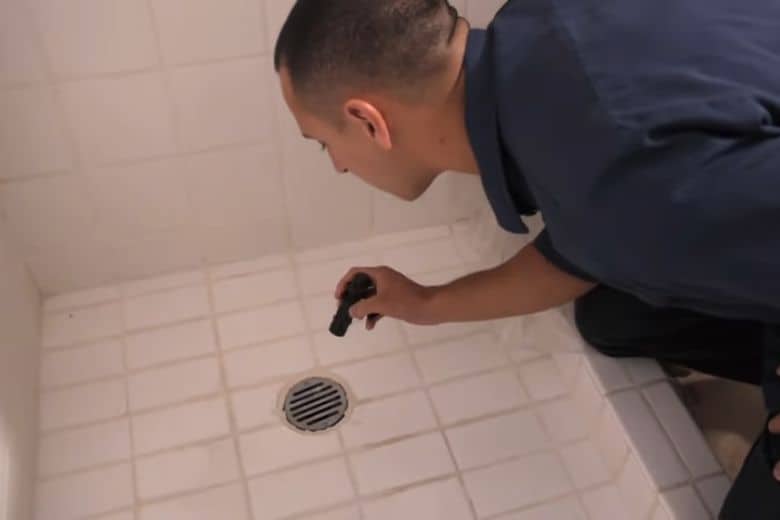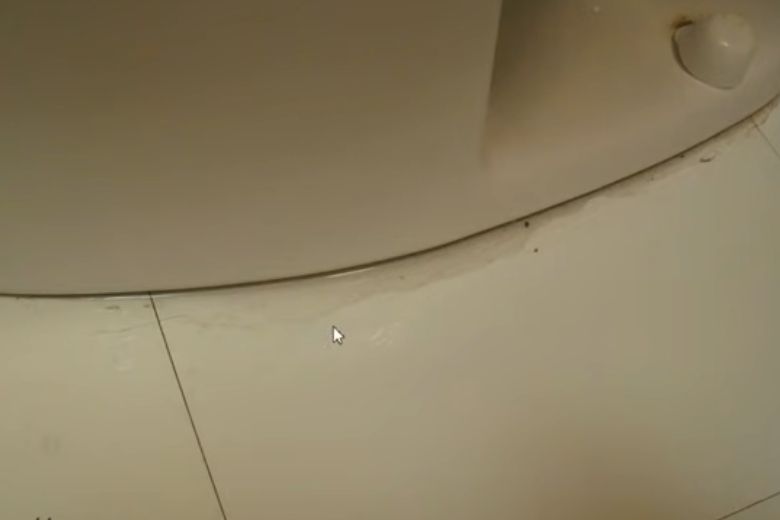The pee-like smell in the bathroom or shower is common. But it is certainly annoying and unbreathing. When it happens, no doubt you feel frustrated and wonder why does my shower smell like pee?
But fear not, because we have found an effective solution for this unexpected problem.
With that said, we are here to explore potential causes of a shower smelling like pee. Therefore, discuss practical solutions to eliminate the odor once and for all.
Possible Causes of a Shower Smelling Like Pee
Before we go for the solution to this unpleasant smell. We must understand how many factors contribute to this unpleasant odor. You must identify the specific cause of your situation. Because the remedies may vary depending on the underlying issue.
Let’s explore some common causes and their corresponding solutions.
1. Poor Ventilation and Drainage
Inadequate ventilation and drainage are common culprits for unpleasant odors in the shower drain. Without proper ventilation, moisture accumulates. Consequently, it creates a breeding ground for bacteria and mold. These microbial organisms produce a foul smell that can resemble that of urine.
Similarly, if the drain in your shower is clogged or not functioning efficiently. The stagnant water can accumulate, leading to bacterial growth and unpleasant odors.
Solution for Poor Ventilation and Drainage
- Ensure proper ventilation: Install an exhaust fan or open windows to improve airflow and reduce moisture buildup. It will help prevent the growth of odor-causing bacteria.
- Maintain clean drains: Regularly clean and unclog your shower drains. You can use a plunger or a mixture of baking soda and vinegar to clear blockages and eliminate odor-causing debris.
2. Bacterial or Fungal Infections
Sometimes, your shower’s urine smell may result from bacterial or fungal infections. These infections can occur in various areas, such as the showerhead, grout, shower drain, sink drain, or even within the shower curtain. Bacteria and fungi thrive in warm and moist environments.
Therefore, make your shower an ideal breeding ground for them.
Solution for Bacterial or Fungal Infections
- Clean and disinfect: Regularly clean your shower area—the showerhead, grout, and other surfaces prone to bacteria or fungal growth. Use an appropriate cleaning agent. Besides, you can use water and vinegar to disinfect the affected areas.
- Replace old shower curtains: If your shower curtain has visible signs of mold or mildew. Take your time replacing it to prevent further contamination and odor development.
3. Chemical Reactions
Specific chemical reactions can also be responsible for the unpleasant odor in your shower. One typical example is the reaction between chlorine. A chemical commonly used in tap water and organic matter present in soap or body wash residues. This reaction can produce foul-smelling compounds. It might give off a urine-like odor.
Solution for Bacterial or Chemical Reactions
- Switch to chlorine-free water: Consider installing a water filter or using chlorine-free water in your shower. This can help reduce the likelihood of chemical reactions that lead to unpleasant odors.
- Thoroughly rinse shower surfaces: After using soap or body wash, rinse your shower surfaces thoroughly to remove any residue that could react with chlorine.
4. Hard Water Deposits
Hard water is a common problem in many households. It occurs when water contains a high concentration of minerals like calcium and magnesium. Over time, these minerals accumulate in your showerhead and pipes, forming hard water deposits.
These deposits can create an ideal breeding ground for bacteria. Therefore, it leads to unpleasant odors resembling urine.
Solution for Hard Water Deposits
- Use descaling products: Commercial descaling agents are available in stores and dissolve mineral deposits effectively.
- Natural remedies: Vinegar or lemon juice can be used as natural alternatives. Apply them to the affected areas and scrub gently to break down the deposits.
- Consider installing a water softener: Water softeners remove minerals from the water supply. It prevents the formation of hard water deposits. Consult a professional to determine the right water softener for your needs and have it installed properly.
- Use a showerhead filter: Installing a showerhead filter can help reduce the mineral content in the water, minimizing the formation of hard water deposits. Look for filters specifically designed to remove minerals and improve water quality.
5. Presence of Biofilm
Biofilm is a slimy layer forming on surfaces when bacteria and other microorganisms adhere to them. In showers, biofilm can develop on tiles, grout lines, and other damp areas. This biofilm can emit unpleasant odors, including a pee-like smell. Because of the breakdown of organic matter by bacteria.
Regular cleaning might not effectively remove this stubborn film, requiring specific techniques for its eradication.
Solution for the Presence of Biofilm
- Regular cleaning to remove biofilm: Clean your shower regularly using appropriate cleaning agents. Use a mild detergent or an antibacterial cleaner. Pay extra attention to areas prone to biofilm formation, such as grout lines, tile corners, and showerhead nozzles. Scrub the surfaces thoroughly to remove any visible biofilm.
- Deep cleaning to eliminate stubborn biofilm: For more stubborn biofilm, use specialized cleaners designed to target biofilm and kill bacteria and fungi. Follow the instructions provided by the manufacturer and ensure proper ventilation while using these cleaners. Scrub the affected areas with a brush to dislodge and remove the biofilm.
- Improve ventilation: Ensure proper ventilation in your bathroom to reduce moisture levels, as biofilm thrives in damp environments. Use exhaust fans or open windows during and after showering.
- Regularly replace or clean shower accessories: Shower accessories like loofahs, bath sponges, and shower curtains can harbor biofilm and contribute to the odor. Clean or replace these items regularly to prevent biofilm growth and maintain a fresh-smelling shower.
- Maintain a dry shower environment: After showering, wipe down the shower surfaces, including the walls, floor, and glass doors, to remove excess moisture. Use a squeegee or a towel to dry the surfaces thoroughly.
6. Sewer Gas Leakage
Another potential cause of the pee-like smell in your shower could be sewer gas leakage. Sewer gas comprises various gases, including methane, hydrogen sulfide, and ammonia. If there are cracks or leaks in the plumbing system. Then sewer gas can escape and infiltrate your shower, resulting in an offensive odor like urine.
Detecting and rectifying these leaks is crucial for restoring a pleasant showering experience.
Solution for Sewer Gas Leakage
Step 1: Identify signs of sewer gas leakage:
- Foul, rotten egg-like odor in the shower or bathroom.
- Gurgling sounds in the drain or toilet.
- Patches of dampness or water near the plumbing fixtures.
Step 2: Locate the source of the sewer gas leakage:
- Inspect the drain trap, pipes, and plumbing connections for any visible signs of damage or leaks.
- Check for cracks, loose fittings, or broken seals in the plumbing system.
Step 3: Repair or replace damaged plumbing components:
If you identify any leaks or damaged parts, repair them promptly.
- Tighten loose fittings, replace cracked pipes, and fix broken seals.
- Use appropriate tools and materials or seek professional assistance if necessary.
Step 4: Install drain traps or replace existing ones:
- Drain traps are designed to prevent sewer gas from entering the living spaces.
- Ensure that drain traps are properly installed and functioning effectively.
- Consider replacing old or faulty drain traps to create a reliable barrier against sewer gas leakage.
Step 5: Ventilate the plumbing system:
- Insufficient ventilation can contribute to the build-up of sewer gas.
- Ensure the plumbing system is adequately vented to allow the gas to escape outdoors.
- Consult a plumber or ventilation specialist if you suspect issues with the ventilation system.
Step 6: Check for sewer line blockages:
- Clogged or blocked sewer lines can cause sewer gas to back up into your shower or bathroom.
- If you experience persistent sewer gas odor, consider having your sewer lines inspected and cleaned by a professional plumber.
Step 7: Use plumbing smoke tests:
- Plumbing smoke tests introduce non-toxic smoke into the plumbing system to detect leaks or openings.
- Smoke tests can help identify hidden sources of sewer gas leakage.
- Hire a professional plumber who specializes in smoke testing for accurate results.
7. Urine Contamination
While it may seem obvious, it’s worth considering whether urine contamination is the cause of the urine smell in your shower. If someone in your household has poor aim. Even if there are small children who use the bathroom. Its possible urine may have accidentally found its way onto the shower floor or other surfaces.
Even small amounts of urine can create a strong odor, so it’s important to rule out this possibility.
Solution for Urine Contamination
- Clean and disinfect affected areas: Thoroughly clean the shower area, including the floor, walls, and fixtures, using a disinfectant cleaner. Pay extra attention to areas with visible urine stains or odor. Rinse the surfaces thoroughly after cleaning to remove any residue.
- Replace shower curtains and mats: If urine contamination has affected shower curtains, mats, or other fabric items, replace them. Washable items should be laundered with an appropriate detergent and disinfectant.
- Enhance bathroom ventilation: Ensure proper ventilation to minimize moisture and odors. Use exhaust fans or open windows to facilitate air circulation.
- Encourage proper bathroom habits: Educate household members, especially children. Make them understand the importance of good bathroom hygiene. Encourage flushing toilets after use and prompt cleaning of any urine spills. Clean the toilet bowl at least 3 times a week to prevent urine residue from accumulating.
8. Plumbing Problems
Sometimes, the root cause of the urine-like smell in your shower might be plumbing-related. Issues such as damaged or leaking pipes, sewage backup, or improper installation can result in unpleasant odors seeping into your shower area.
Solution for Plumbing Problems
Contact a professional plumber: A qualified plumber can inspect your plumbing system to identify any underlying issues and recommend appropriate repairs or replacements.
When to Seek Professional Help
In most cases, the solutions mentioned above should help eliminate the pee-like smell from your shower. However, if you’ve tried these methods without success, it might be time to seek professional help.
1. When DIY Methods Don’t Work
Persistent shower odors may indicate underlying issues that require professional intervention. If you’ve followed all the recommended steps to eliminate the smell, but it persists. It’s best to consult a plumber or a bathroom specialist who can assess the situation and provide expert advice.
2. Consulting a Plumber
A qualified plumber can investigate your plumbing system for any hidden problems causing the unpleasant smell. They can identify faulty or damaged pipes, inadequate venting, or other plumbing-related concerns requiring repairs or replacements. Consulting a professional ensures that all potential causes are thoroughly evaluated and addressed.
Frequently Asked Questions
Will using scented shower products solve the problem?
Answer: While scented shower products can mask temporary odors, they won’t eliminate the underlying cause. It’s essential to address the root cause of the smell and maintain proper hygiene and cleaning practices.
Are there any health risks associated with a smelly shower?
Answer: Persistent unpleasant odors in your shower may indicate the presence of bacteria or other contaminants. While the odors themselves may not pose a direct health risk, it’s important to maintain a clean and hygienic bathroom environment to prevent potential health issues.
Does water reduce urine smell?
Answer: Water alone may not be enough to eliminate the smell of urine in a shower. While water can help dilute the urine and reduce the intensity of the odor but can’t stop it.
Conclusion
Dealing with unpleasant shower drains or nasty sink drains is puzzling and breathtaking. If you follow our above mention steps. In that case, you can confidently enjoy a refreshing shower experience without the worry of unpleasant smells.
Have a good day. That’s all for today. If you still have any questions, remain. Comment us; we will get back to you as soon as possible.
Paul Newman is a blogger who writes about plumbing and home improvement. Over the past 20 years, I have worked as a plumber. My passion is to share my knowledge and experience with others to improve their homes.




